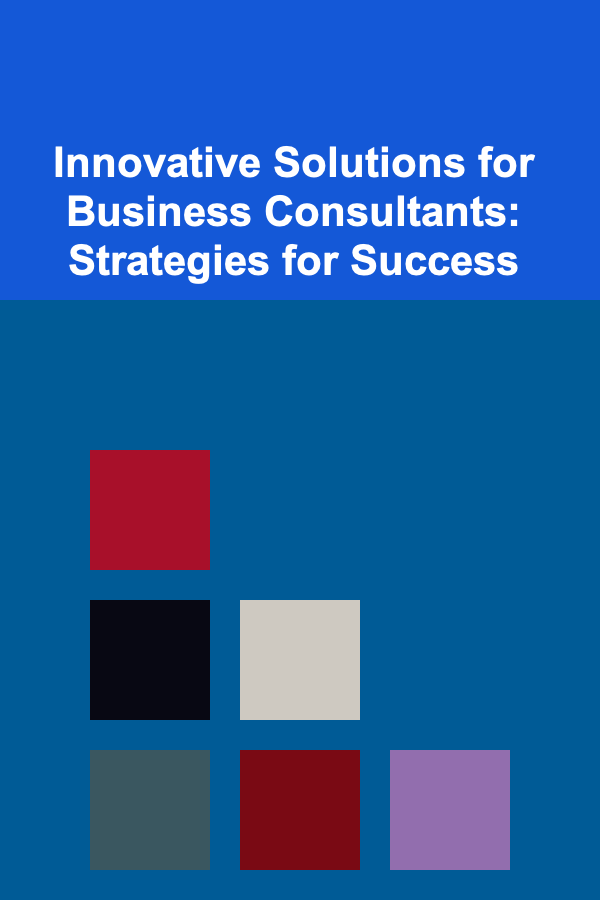
Innovative Solutions for Business Consultants: Strategies for Success
ebook include PDF & Audio bundle (Micro Guide)
$12.99$6.99
Limited Time Offer! Order within the next:

Business consultants play a pivotal role in helping companies navigate challenges, improve performance, and achieve growth. As the business landscape continues to evolve, the need for innovative solutions has become more important than ever. Consultants must not only rely on traditional methodologies but also embrace cutting-edge strategies that deliver value in a rapidly changing environment. In this guide, we will explore innovative solutions that business consultants can leverage to stand out in a competitive marketplace, offer more effective strategies to clients, and ensure long-term success in their careers.
Embrace Data-Driven Decision Making
In today's world, data is a critical asset. Businesses generate vast amounts of data daily, and leveraging this data for decision-making is no longer optional---it's a necessity. Consultants who can use data analytics to inform their strategies have a significant advantage over those who rely solely on intuition or experience.
1.1 Use Predictive Analytics for Strategic Planning
Predictive analytics involves using historical data, statistical algorithms, and machine learning techniques to predict future trends. For business consultants, applying predictive analytics can provide clients with actionable insights, such as:
- Identifying potential risks: Predictive models can flag potential risks before they materialize, allowing businesses to act proactively.
- Forecasting market trends: By understanding future trends, consultants can help clients stay ahead of competitors and make informed decisions.
- Optimizing resource allocation: Data-driven insights can help businesses allocate resources more efficiently, reducing waste and improving profitability.
Using predictive analytics can transform how a consultant delivers solutions, moving from reactive problem-solving to proactive strategic guidance.
1.2 Implement Real-Time Data Dashboards
Real-time data dashboards allow businesses to monitor key performance indicators (KPIs) in real time, providing instant insights into how their operations are performing. As a consultant, integrating these dashboards into your client's operations can help them make better-informed decisions faster.
- Quick decision-making: Real-time data allows decision-makers to respond to issues or opportunities as soon as they arise.
- Transparency and accountability: Dashboards make data accessible across the organization, promoting transparency and accountability in decision-making processes.
- Customized reporting: Consultants can tailor dashboards to specific business needs, providing the most relevant insights to executives, managers, and staff.
By implementing these dashboards, consultants can add significant value to their clients, helping them understand and act on business metrics without delay.
Foster a Culture of Innovation Within the Client's Organization
As a business consultant, your role extends beyond offering immediate solutions; it also involves fostering an environment that encourages creativity, experimentation, and continuous improvement. Organizations that prioritize innovation are better equipped to adapt to market changes and stay competitive.
2.1 Promote Design Thinking for Problem-Solving
Design thinking is an innovative approach to problem-solving that focuses on empathy, creativity, and iterative testing. By applying design thinking, consultants can help organizations:
- Understand customer needs: This human-centered approach ensures that solutions are tailored to the real needs and desires of the customer.
- Encourage creative problem-solving: Design thinking encourages out-of-the-box thinking, helping organizations find new and effective ways to tackle challenges.
- Iterate and improve: With an emphasis on prototyping and testing, design thinking allows organizations to test ideas quickly and refine them based on feedback, leading to more successful solutions.
As a consultant, helping your clients implement design thinking processes can lead to breakthrough solutions and a more agile, customer-centric approach to business.
2.2 Implement Open Innovation Practices
Open innovation is the practice of leveraging external sources of knowledge and ideas to accelerate internal innovation. In the context of consulting, this means helping your clients look beyond their own organization for solutions, collaborating with other businesses, academic institutions, or even customers. Benefits include:
- Access to diverse ideas: By opening up the innovation process, businesses can tap into a broader pool of ideas and expertise.
- Faster problem-solving: Collaborative efforts can speed up the development of new products, services, or business processes.
- Increased creativity: Exposure to different viewpoints and approaches can lead to more creative and innovative solutions.
Encouraging open innovation can help your clients stay on the cutting edge and remain adaptable in a dynamic business environment.
Leverage Technology to Drive Efficiency
Technology has transformed nearly every aspect of business, and consultants who harness the power of the latest tech tools can provide exceptional value to clients. Embracing emerging technologies enables consultants to streamline processes, improve productivity, and uncover new opportunities.
3.1 Implement Automation and AI Solutions
Artificial intelligence (AI) and automation technologies can be game-changers for businesses looking to increase efficiency and reduce costs. As a business consultant, integrating AI solutions can help your clients:
- Automate repetitive tasks: AI and machine learning can handle repetitive administrative tasks, freeing up valuable human resources for more strategic activities.
- Improve decision-making: AI-driven analytics can process large datasets to uncover insights that would be impossible to derive manually.
- Enhance customer experience: AI tools like chatbots and recommendation engines can improve customer service, personalization, and engagement.
By introducing clients to automation and AI, you can help them optimize their operations and stay competitive in a fast-moving digital economy.
3.2 Utilize Cloud-Based Solutions
Cloud computing has revolutionized how businesses store, manage, and access data. Cloud-based solutions offer flexibility, scalability, and cost-efficiency, making them ideal for businesses looking to enhance their operations. Consultants can guide clients in adopting cloud technologies that:
- Improve collaboration: Cloud platforms enable teams to collaborate seamlessly, regardless of location.
- Enhance scalability: Businesses can scale their infrastructure up or down based on demand without the need for costly investments in physical hardware.
- Ensure business continuity: Cloud-based systems offer robust backup solutions, helping businesses recover quickly from disruptions.
Encouraging your clients to move to the cloud can modernize their operations and improve efficiency across departments.
Cultivate Strong Client Relationships
The success of a business consultant isn't just about providing great solutions; it's also about building long-term relationships with clients. Strong relationships are built on trust, understanding, and effective communication.
4.1 Be a Trusted Advisor, Not Just a Service Provider
While it's important to deliver results, consultants should aim to be seen as trusted advisors by their clients. This means going beyond providing answers and offering strategic guidance that aligns with their long-term objectives. To do this:
- Understand your client's goals: Get to know your client's vision and business goals so that you can provide tailored advice that supports their aspirations.
- Offer proactive solutions: Don't wait for problems to arise---be proactive in identifying potential challenges and proposing solutions.
- Be transparent: Build trust by being open about potential risks and challenges. Clients value honesty and transparency.
Being a trusted advisor means that your clients will turn to you not just for specific projects, but for ongoing strategic support.
4.2 Nurture Long-Term Partnerships
Consultants who maintain long-term relationships with clients can ensure a steady stream of work and referrals. To build lasting partnerships:
- Follow up after projects: Don't let relationships fizzle out once a project ends. Schedule regular follow-ups to check in on progress and offer additional support.
- Provide ongoing value: Offer your clients resources, training, or new insights to continue adding value even after the engagement ends.
- Encourage feedback: Regularly solicit feedback to improve your services and show that you are committed to continuously meeting your clients' needs.
By focusing on long-term relationship-building, you can become an integral part of your clients' success.
Continuously Evolve Your Skillset
The consulting landscape is constantly changing, with new methodologies, technologies, and trends emerging regularly. To remain competitive, it's essential for business consultants to continuously evolve their skills and expertise.
5.1 Stay Current with Industry Trends
Subscribe to industry journals, attend conferences, and participate in webinars to keep up with the latest trends and innovations in business consulting. This will allow you to stay ahead of the curve and offer cutting-edge solutions to your clients.
5.2 Invest in Professional Development
Consultants who are committed to their professional growth are more likely to build successful, sustainable careers. Consider earning certifications, pursuing advanced degrees, or engaging in training programs to enhance your skillset. Specialized expertise in areas like data analytics, project management, or digital transformation can set you apart from your competitors.
In conclusion, business consultants who embrace innovation, leverage technology, foster strong relationships, and continuously enhance their skill sets will position themselves for long-term success. By adopting these strategies and offering forward-thinking solutions, consultants can provide exceptional value to their clients, helping them thrive in an increasingly complex and competitive business environment.

How To Build a Powerful Brand Story
Read More
How to Develop Renewable Energy Cooperatives
Read More
How to Provide Feedback Effectively in Virtual Teams
Read More
How to Stage Your Home When You Have Limited Space
Read More
How To Understand the History of Extreme Sports
Read More
Mindful Shopping: Cutting Down on Impulse Online Purchases
Read MoreOther Products

How To Build a Powerful Brand Story
Read More
How to Develop Renewable Energy Cooperatives
Read More
How to Provide Feedback Effectively in Virtual Teams
Read More
How to Stage Your Home When You Have Limited Space
Read More
How To Understand the History of Extreme Sports
Read More